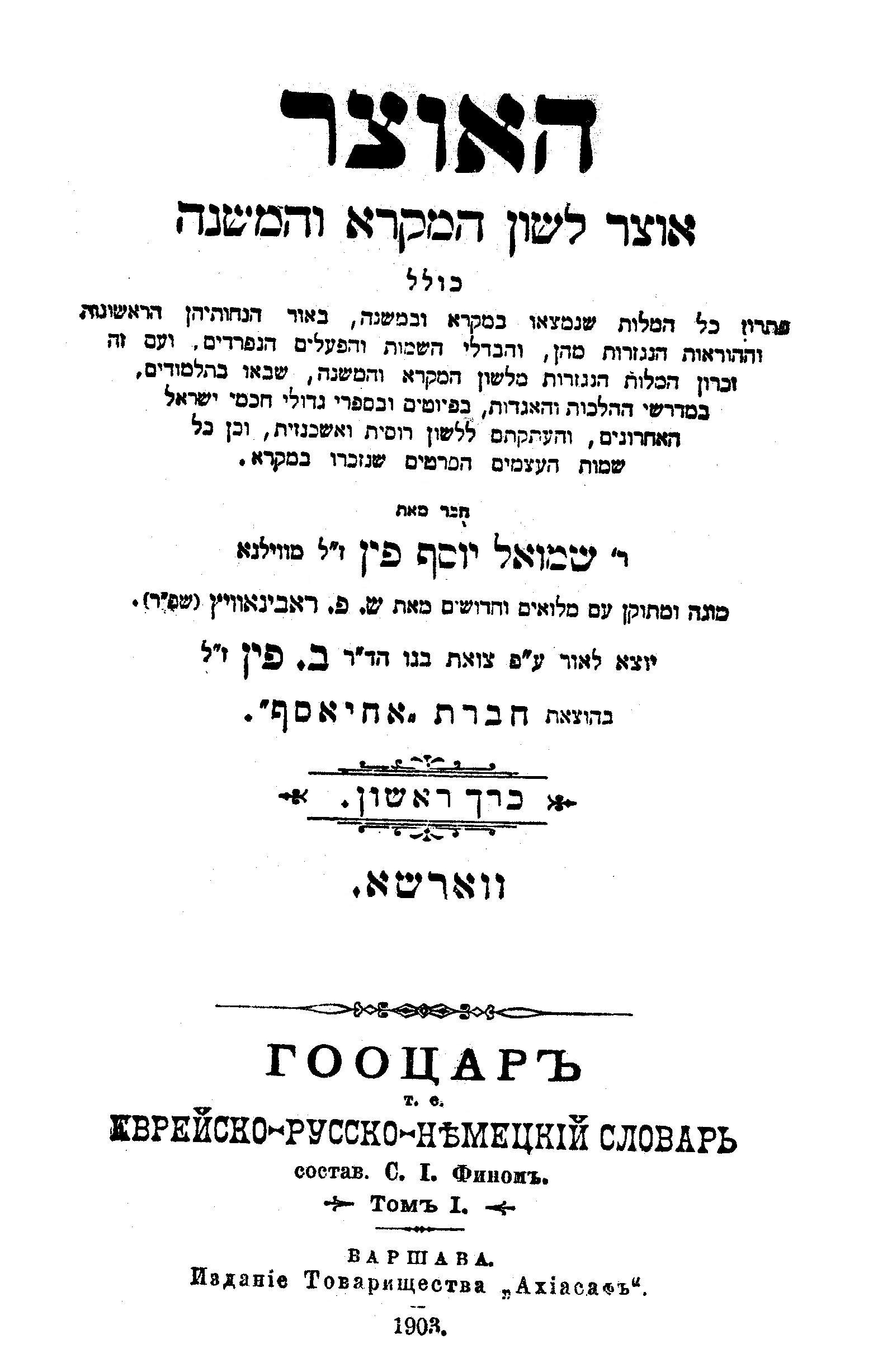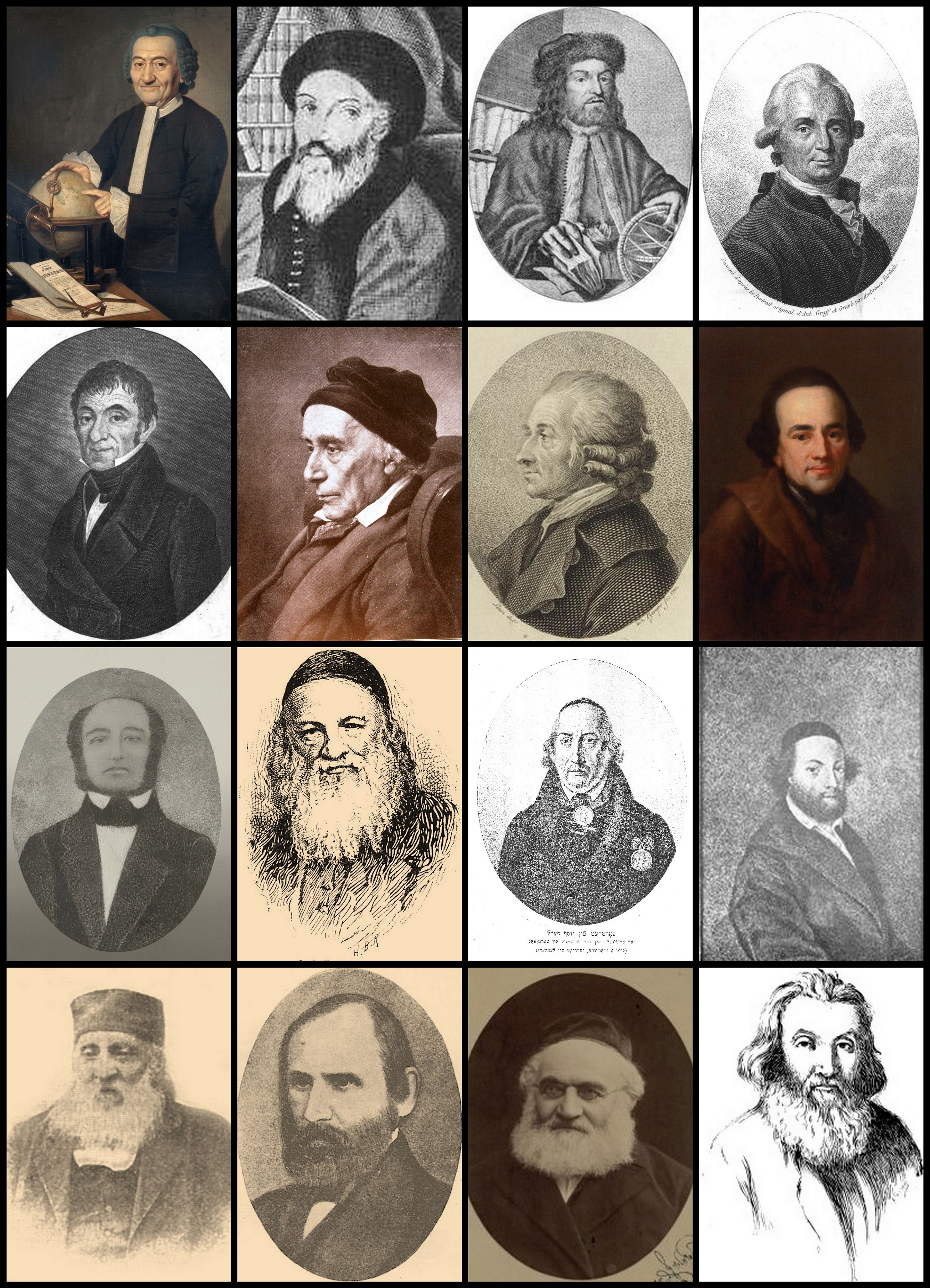|
Vilna Rabbinical School And Teachers' Seminary
The Vilna Rabbinical School and Teachers' Seminary was a controversial Russian state-sponsored institution to train Jewish teachers and rabbis, located in Vilna, Russian Empire. The school opened in 1847 with two divisions: a rabbinical school and a teachers' seminary. The Rabbinical School was closed in 1873 and the Teachers' Seminary closed in 1914. The school taught secular studies, unlike the traditional cheders and yeshivas. This new curriculum, as well as the government control, made the school "unpopular." Curriculum The school taught German language, Hebrew language, Hebrew Bible, Talmud, algebra, geometry, trigonometry, physics, astronomy, world history, Russian history, Russian language, geography, and handwriting and drawing. History Rabbi Yisroel Salanter, a major figure of the Mussar movement who then lived in Vilna, was pressured to lead the seminary. Rather than accept the position, Salanter fled to Kovno, even though Rabbi Yitzhak of Volozhin encouraged him to ... [...More Info...] [...Related Items...] OR: [Wikipedia] [Google] [Baidu] |
Kovno
Kaunas (; ; also see other names) is the second-largest city in Lithuania after Vilnius and an important centre of Lithuanian economic, academic, and cultural life. Kaunas was the largest city and the centre of a county in the Duchy of Trakai of the Grand Duchy of Lithuania and Trakai Palatinate since 1413. In the Russian Empire, it was the capital of the Kaunas Governorate from 1843 to 1915. During the interwar period, it served as the temporary capital of Lithuania, when Vilnius was seized and controlled by Poland between 1920 and 1939. During that period Kaunas was celebrated for its rich cultural and academic life, fashion, construction of countless Art Deco and Lithuanian National Romanticism architectural-style buildings as well as popular furniture, the interior design of the time, and a widespread café culture. The city interwar architecture is regarded as among the finest examples of European Art Deco and has received the European Heritage Label. It contributed to K ... [...More Info...] [...Related Items...] OR: [Wikipedia] [Google] [Baidu] |
Orthodox Jewish Educational Institutions
Orthodox, Orthodoxy, or Orthodoxism may refer to: Religion * Orthodoxy, adherence to accepted norms, more specifically adherence to creeds, especially within Christianity and Judaism, but also less commonly in non-Abrahamic religions like Neo-paganism or Hinduism Christian Traditional Christian denominations * Eastern Orthodox Church, the world's second largest Christian church, that accepts seven Ecumenical Councils *Oriental Orthodox Churches, a Christian communion that accepts three Ecumenical Councils Modern denominations * True Orthodox Churches, also called Old Calendarists, a movement that separated from the mainstream Eastern Orthodox Church in the 1920s over issues of ecumenism and calendar reform * Reformed Orthodoxy (16th–18th century), a systematized, institutionalized and codified Reformed theology * Neo-orthodoxy, a theological position also known as ''dialectical theology'' * Paleo-orthodoxy, (20th–21st century), a movement in the United States focusing ... [...More Info...] [...Related Items...] OR: [Wikipedia] [Google] [Baidu] |
Jewish Seminaries
Jews ( he, יְהוּדִים, , ) or Jewish people are an ethnoreligious group and nation originating from the Israelites Israelite origins and kingdom: "The first act in the long drama of Jewish history is the age of the Israelites""The people of the Kingdom of Israel and the ethnic and religious group known as the Jewish people that descended from them have been subjected to a number of forced migrations in their history" and Hebrews of historical Israel and Judah. Jewish ethnicity, nationhood, and religion are strongly interrelated, "Historically, the religious and ethnic dimensions of Jewish identity have been closely interwoven. In fact, so closely bound are they, that the traditional Jewish lexicon hardly distinguishes between the two concepts. Jewish religious practice, by definition, was observed exclusively by the Jewish people, and notions of Jewish peoplehood, nation, and community were suffused with faith in the Jewish God, the practice of Jewish (religious) la ... [...More Info...] [...Related Items...] OR: [Wikipedia] [Google] [Baidu] |
Yad Vashem
Yad Vashem ( he, יָד וַשֵׁם; literally, "a memorial and a name") is Israel's official memorial to the victims of the Holocaust. It is dedicated to preserving the memory of the Jews who were murdered; honoring Jews who fought against their Nazi oppressors and Gentiles who selflessly aided Jews in need; and researching the phenomenon of the Holocaust in particular and genocide in general, with the aim of avoiding such events in the future. Established in 1953, Yad Vashem is located on the western slope of Mount Herzl, also known as the Mount of Remembrance, a height in western Jerusalem, above sea level and adjacent to the Jerusalem Forest. The memorial consists of a complex containing two types of facilities: some dedicated to the scientific study of the Holocaust and genocide in general, and memorials and museums catering to the needs of the larger public. Among the former there are a research institute with archives, a library, a publishing house, and an educational ... [...More Info...] [...Related Items...] OR: [Wikipedia] [Google] [Baidu] |
Ethnography
Ethnography (from Greek ''ethnos'' "folk, people, nation" and ''grapho'' "I write") is a branch of anthropology and the systematic study of individual cultures. Ethnography explores cultural phenomena from the point of view of the subject of the study. Ethnography is also a type of social research that involves examining the behavior of the participants in a given social situation and understanding the group members' own interpretation of such behavior. Ethnography in simple terms is a type of qualitative research where a person puts themselves in a specific community or organization in attempt to learn about their cultures from a first person point-of-view. As a form of inquiry, ethnography relies heavily on participant observation—on the researcher participating in the setting or with the people being studied, at least in some marginal role, and seeking to document, in detail, patterns of social interaction and the perspectives of participants, and to understand these i ... [...More Info...] [...Related Items...] OR: [Wikipedia] [Google] [Baidu] |
Solomon Salkind
Solomon (; , ),, ; ar, سُلَيْمَان, ', , ; el, Σολομών, ; la, Salomon also called Jedidiah ( Hebrew: , Modern: , Tiberian: ''Yăḏīḏăyāh'', "beloved of Yah"), was a monarch of ancient Israel and the son and successor of David, according to the Hebrew Bible and the Old Testament. He is described as having been the penultimate ruler of an amalgamated Israel and Judah. The hypothesized dates of Solomon's reign are 970–931 BCE. After his death, his son and successor Rehoboam would adopt harsh policy towards the northern tribes, eventually leading to the splitting of the Israelites between the Kingdom of Israel in the north and the Kingdom of Judah in the south. Following the split, his patrilineal descendants ruled over Judah alone. The Bible says Solomon built the First Temple in Jerusalem, dedicating the temple to Yahweh, or God in Judaism. Solomon is portrayed as wealthy, wise and powerful, and as one of the 48 Jewish prophets. He is also the s ... [...More Info...] [...Related Items...] OR: [Wikipedia] [Google] [Baidu] |
Aaron Samuel Liebermann
Aaron Samuel Liebermann (, ''Aharon Shmu'el Liberman''; 20 May 1845 – 18 November 1880), also known by his pen names Bar Drora and Daniel Ish Ḥamudot and later as Arthur Freeman, was a socialist author, Hebrew translator, and political essayist. A pioneer of Jewish socialism and the Jewish labour movement, he was described by Rudolf Rocker and Ber Borochov as the "father of Jewish socialism". Biography Early life Aaron Samuel Liebermann was born in Luna, a shtetl in the province of Grodno, Russia. His father, Eliezer Dov Liebermann, was a maskilic author and scholar. His family moved to Bialystok and from there to Suvalk, where Liebermann received his early education. In 1866, he married Raḥel Trotsky, with whom he had three daughters and a son. He graduated from the Vilna Rabbinical Seminary with a teacher's diploma in 1867, and returned to Suvalk, where he was appointed secretary of the community and teacher. He began studies at the Technological Institute of St. ... [...More Info...] [...Related Items...] OR: [Wikipedia] [Google] [Baidu] |
Samuel Joseph Fuenn
Samuel Joseph Fuenn (; 15 October 1818 – 11 January 1891), also known as Rashi Fuenn () and Rashif (), was a Lithuanian Hebrew writer, scholar, printer, and editor. He was a leading figure of the eastern European Haskalah, and an early member of Ḥovevei Zion. Biography Fuenn was born in Vilna, Russian Empire, the son of merchant and Torah scholar Yitsḥak Aizik Fuenn of Grodno. Though he received a traditional religious education until the age of 17, he also acquired an extensive general knowledge of German literature and other secular subjects, and became proficient in Russian, French, Latin, Polish, and English. He afterwards joined Vilna's circle of young ''maskilim''. In 1848 the government appointed him teacher of Hebrew and Jewish history in the newly founded rabbinical school of Vilna. Fuenn filled this position with great distinction till 1856, when he resigned. The government then appointed him superintendent of the Jewish public schools in the district of Vilna, ... [...More Info...] [...Related Items...] OR: [Wikipedia] [Google] [Baidu] |
Haskalah
The ''Haskalah'', often termed Jewish Enlightenment ( he, השכלה; literally, "wisdom", "erudition" or "education"), was an intellectual movement among the Jews of Central and Eastern Europe, with a certain influence on those in Western Europe and the Muslim world. It arose as a defined ideological worldview during the 1770s, and its last stage ended around 1881, with the rise of Jewish nationalism. The ''Haskalah'' pursued two complementary aims. It sought to preserve the Jews as a separate, unique collective, and it pursued a set of projects of cultural and moral renewal, including a revival of Hebrew for use in secular life, which resulted in an increase in Hebrew found in print. Concurrently, it strove for an optimal integration in surrounding societies. Practitioners promoted the study of exogenous culture, style, and vernacular, and the adoption of modern values. At the same time, economic production, and the taking up of new occupations was pursued. The ''Haskalah'' pr ... [...More Info...] [...Related Items...] OR: [Wikipedia] [Google] [Baidu] |
Vladimir Jochelson
Vladimir Ilyich Jochelson (russian: Владимир Ильич Иохельсон) (January 14 ( N.S. January 26), 1855, Vilnius - November 2, 1937, New York City) was a Russian ethnographer and researcher of the indigenous peoples of the Russian North. Biography Jochelson came from a wealthy, religious Jewish family. He attended the Vilna Rabbinical Seminary, where he participated in the socialist, revolutionary group Narodnaya Volya. Compelled to leave Russia in 1875, he went first to Berlin and then in 1879 to Switzerland, where he remained four years, studying at Zurich and then teaching at a school on the Lake of Geneva, while keeping in touch with the revolutionary movement as editor of the ''Vyestnik Narodnoi Voli'', which had a clandestine circulation in Russia. On his return to Russia in 1884 he was recognised, arrested and confined for three years in the Petro-Pavlovsk fortress in St. Petersburg, and in 1887 was sentenced by order of the czar to exile for ten years in ... [...More Info...] [...Related Items...] OR: [Wikipedia] [Google] [Baidu] |






